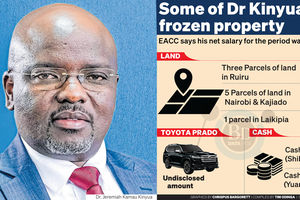
Former Public Service Cabinet Secretary Moses Kuria.
Barely four months after the Kenya Kwanza government assumed power, the Kenya Bureau of Standards (Kebs) received a peculiar order from the Ministry of Industry, Trade, and Investments, then headed by former Gatundu South MP Moses Kuria.
Mr Kuria stated that the government was seeking to cut reliance on imports and enhance exports. To this end, Kebs was to share its annual revenue with the Kenya Export Promotion and Branding Agency (Keproba) – a separate State body that also gets annual budget allocations from the National Treasury.
The order was peculiar because Keproba is a State corporation that solely exists to promote Kenyan exports, and to push the country’s brand globally, still to enhance exports.
Under this arrangement, Kebs was to transfer Sh2.2 billion to Keproba.
Keproba was created in 2019 by amalgamating the Export Promotion Council and the Brand Kenya Board. Its export promotion strategies were outlined in Keproba’s strategic plan for 2019-2022. The same function was included in its new strategic plan for 2023-2027.
The agency had 82 staffers in the 2022/23 financial year and was allocated Sh1.019 billion. In comparison, Kebs has 1,200 staff – more than six times that of Keproba.
Interestingly, Keproba is now also set for a merger with the Kenya Tourism Board, Tourism Research Institute, and Kenya Yearbook Editorial Board. The merger is among the austerity measures President Ruto made in June.
On Thursday, Mr Kuria declined to comment on our questions on whether the deal was above board.
“Look for something useful to do,” Mr Kuria said before disconnecting the call.
As expected, alarm bells at Kebs rang, and its top brass started to figure out what to do, and how to mitigate the potential financial chaos that the funds transfer could cause.
Kebs Import Revenue
Internal documents seen by the Nation show that the Kebs National Standards Council held a special meeting on November 4, 2022.
The sole agenda of the meeting was consideration of sharing of Kebs Import Revenue with Keproba.
The Industry and Trade ministry had proposed taking a share of destination inspection fees (Sh1.26 billion) and Pre-Export Verification of Conformity royalties (Sh453.43 million).
By this time the funds demand had been revised downwards to Sh1.7 billion.
Mr Kuria had stated that Keproba would use the funds to develop an export development strategy, and this was captured in the Board paper and minutes from the meeting.
Honouring the funds' transfer to Keproba was to come at a heavy cost, as it would have to dig into its operation expenses.
This meant that if Kebs could not find a way to increase revenue, whether by improving its service charges or conjuring up new streams, the agency would struggle to even pay its workers.
“The amount to Keproba will enhance the capacity to grow exports. However, there will be a need for Kebs to revise its operational activities or seek alternative streams since its employee costs amount to Sh2.5 billion, leaving a balance of only Sh800 million for its operational costs,” a Board paper dated November 3, 2022 meeting indicates.
At the time, Kebs had already tightened its belt in line with a National Treasury directive to cut non-essential expenditure, but the Board partially yielded and offered to have Sh1.2 billion sacrificed for the project.
“The sharing of revenue will depress Kebs. Kebs has rationalised its budget as per the National Treasury… From the rationalised budget, the budget will only support Keproba to the tune of Sh1.2 billion beyond, which we will report a deficit at the end of the financial year if we were to give Keproba as per the shared revenue above of Sh1.7 billion,” the Board paper further reads.
After lowering the potential transfer to Sh1.2 billion, the National Standards Council warned that the transaction would only be possible if Kebs generated income as planned.
The Kebs board, however, declined to send the money directly to Keproba and instead approved surrendering it to the National Treasury. The National Treasury would then remit it to Keproba.
Treasury PS Chris Kiptoo did not respond to our calls and text messages inquiring whether the ministry was aware of the arrangement and whether it formally approved the deal between Keproba and Kebs, which was brokered by the Investment, Trade and Industry ministry.
Export Promotion Strategy
Keproba CEO Floice Mukabana on Friday said that Keproba did not receive funds from Kebs.
“Kenya Export Promotion and Branding Agency did not receive any funding from the Kenya Bureau of Standards towards the Export Promotion Strategy,” Ms Mukabana said in an email response.
Ms Mukabana did not, however, clarify whether it received funds from the Exchequer, to whom Kebs had resolved to surrender the Sh1.2 billion.
She also did not clarify whether Keproba has received funds for the export promotion strategy in subsequent financial years.
At the time of the deal, Kebs was struggling to stay afloat.
Kebs said that it has always adhered to legal requirements directing State agencies to remit all surplus funds to the National Treasury.
“Kebs has consistently complied with this requirement, and all financial transactions are conducted with full transparency and accountability under government regulations. Furthermore, KEBS has not engaged in any financial arrangements or projects that would compromise our ability to fulfill our regulatory duties and commitments to our staff and stakeholders,” the agency said on Saturday
In the financial year ended June 2020, Auditor-General Nancy Gathungu stated in a report that Kebs was technically insolvent as its asset base of Sh1.06 billion was far lower than its liabilities, which stood at Sh2.23 billion.
At the end of the 2022/23 financial year, Kebs’ situation had improved, but it was still technically insolvent. Assets stood at Sh1.325 billion, outweighed by liabilities of Sh2.256 billion.
In the 2022/23 financial year, Kebs revenue stood at Sh5.04 billion, while its expenditure was Sh5.4 billion.
Both Kebs and Keproba have denied that any funds were transferred from the former to the latter agency under any joint project.
Kebs said that it has always adhered to legal requirements directing State agencies to remit all surplus funds to the National Treasury.
“Kebs has consistently complied with this requirement, and all financial transactions are conducted with full transparency and accountability under government regulations. Furthermore, Kebs has not engaged in any financial arrangements or projects that would compromise our ability to fulfill our regulatory duties and commitments to our staff and stakeholders,” the agency said on Saturday, August 10, 2024.











